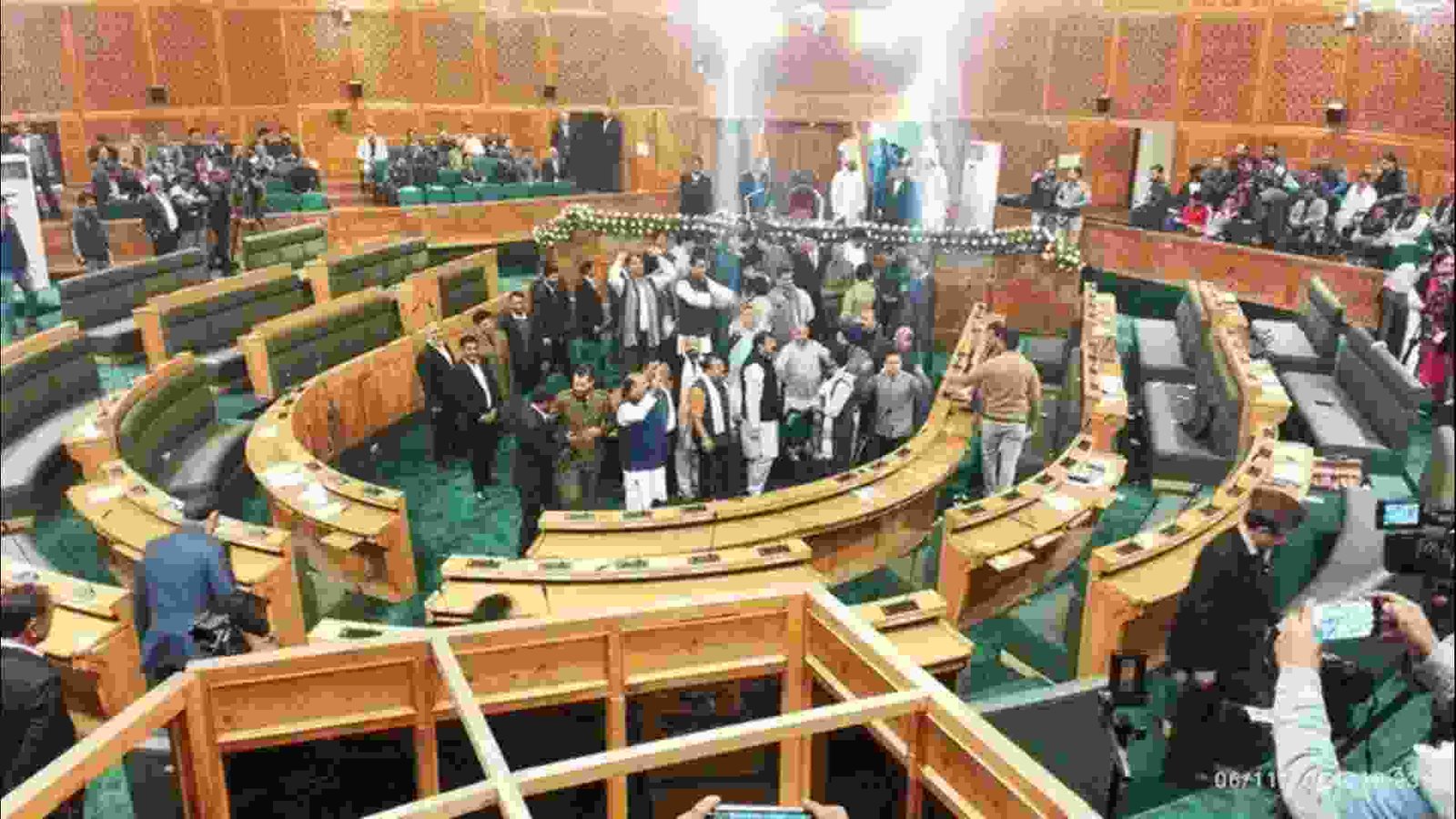What Led to the Current Political Disruption?
On Wednesday, the Jammu and Kashmir assembly became a battleground when Awami Ittehad Party (AIP) MLA Khurshid Ahmad Sheikh, brother of Engineer Rashid,
displayed a banner calling for the restoration of Article 370. The banner ignited heated debates, with BJP members tearing copies of the resolution and protesting on the assembly floor. The display fueled intense arguments, highlighting the deeply rooted tensions surrounding Article 370’s revocation.
The Call for Restoration of Article 370
The deputy chief minister of Jammu and Kashmir, Surinder Choudhary, a National Conference (NC) leader, moved a resolution in the assembly. This resolution asked the Government of India to engage in talks with elected representatives to reinstate the region’s special status. The motion was met with strong opposition from BJP members, who stormed the well of the House,
chanting against the speaker and raising their voices in protest.
Smriti Irani’s Bold Stance on Article 370
Addressing a press conference on Thursday, Smriti Irani didn’t mince words. She categorically stated that Article 370 would not be restored, regardless of the opposition’s push for it. In her speech,
Irani highlighted the BJP’s unwavering commitment to keeping Jammu and Kashmir fully integrated with India.
“I want to assure the people of India that Article 370 will not be restored. Any attempt by the INDIA bloc to divide Jammu and Kashmir from the rest of the country will fail,” said Smriti Irani, making the BJP’s stance crystal clear.
The Core Issue: Why Was Article 370 Revoked?
In August 2019, the Indian government, led by the BJP, revoked Article 370, ending the special autonomous status that Jammu and Kashmir had enjoyed since independence. This move was aimed at integrating the region more closely with the rest of India, ensuring equal rights and representation for all its citizens. However, the decision sparked a mixture of celebration and outrage, dividing political parties and citizens alike.
What Does Article 370’s Revocation Mean for Jammu & Kashmir?
The removal of Article 370 has brought changes in property rights, governance, and reservations for communities such as the tribal groups. According to the BJP, these changes offer more security, economic opportunity,
and equal treatment under Indian law. The opposition, however,
views this as a loss of identity and autonomy for Jammu and Kashmir, creating a flashpoint in Indian politics.
BJP’s View: A Stand Against ‘Extremism’
Irani didn’t stop at just opposing the reinstatement of Article 370. She accused the Congress and the INDIA bloc of indirectly supporting extremist elements. She argued that the push to restore the special status disregards the rights given to marginalized communities in Jammu and Kashmir after the abrogation.
“Yesterday’s resolution reflects the Congress and the INDIA bloc’s veiled support for extremism. They are willing to compromise India’s integrity for political gains,” Irani stated, painting the opposition’s stance as a threat to national unity.
Accusations of Constitutional Disrespect
During her speech, Smriti Irani raised concerns over what she described as an “attempt to strangle the Indian Constitution” by the opposition. She argued that scenes from the assembly,
where BJP members protested against the INDIA bloc’s actions, symbolize a deeper fight for constitutional respect.
“The audacity shown by tearing up the Constitution in Jammu and Kashmir assembly reflects the INDIA bloc’s disregard for the rights of marginalized communities. This is a blow to the Constitution and a disrespect to our democratic values,” she asserted.

Is the Opposition Dividing the Nation?
Irani accused the opposition of attempting to divide the nation by supporting Article 370’s restoration. According to her, the push to reestablish the special status undermines the Indian Constitution, which promises equal rights to all citizens. By advocating for a return to special status, she argued, the INDIA bloc is disregarding the principles of unity and equality.
“The actions of the Congress-led alliance are tearing at the seams of our nation. They want to revert the progress made in the region, and we will not allow that,” she added, reflecting the BJP’s firm stance against regional division.
Impact on the Tribal Community and Women’s Rights
One of the BJP’s main arguments against Article 370’s reinstatement is the impact it would have on marginalized communities, including tribal groups and women. After the revocation, tribal communities in Jammu and Kashmir gained significant rights,
which the BJP claims would threaten restoring the special status.
“Does the Congress stand against the rights of tribal communities in Jammu and Kashmir?” Irani questioned, challenging the opposition to clarify their stance on these crucial issues.
The Role of the INDIA Bloc in This Controversy
The INDIA bloc, a coalition of opposition parties, has consistently criticized the BJP’s stance on Article 370. They argue that the abrogation has eroded the region’s unique cultural identity and autonomy. By backing the resolution in the Jammu and Kashmir assembly,
the INDIA bloc has signaled its support for discussions around reinstating Article 370, leading to a fierce clash with the BJP.
Public Reaction: Divided Opinions on Article 370
The public remains divided over Article 370, with some praising the BJP for its decisive action and others viewing it as an infringement on Jammu and Kashmir’s autonomy. Supporters of the revocation argue that it has brought development and equal rights to the region, while critics claim it has disrupted the social fabric of the area.
Read More: Why a Trump Win May Not Be Negative for Indian IT – Insights from Ramesh Damani
Conclusion
As the political drama in Jammu and Kashmir unfolds, the BJP has made it clear that there will be no compromise on Article 370. Smriti Irani’s strong words reflect the party’s commitment to maintaining the region’s integration with India,
countering any attempt to reverse the 2019 decision. With the INDIA bloc determined to raise this issue, the debate over Article 370 is far from over,
promising continued tension and discussions in India’s political landscape.
Final Thoughts
The future of Article 370 remains uncertain, but one thing is clear: the BJP is unwavering in its stance to keep Jammu and Kashmir as a fully integrated part of India. As discussions continue,
the outcome will undoubtedly shape the political and social landscape of the region,
affecting millions of lives. Will the opposition’s push for restoration succeed,
or will the BJP’s commitment to integration prevail? Only time will tell.





